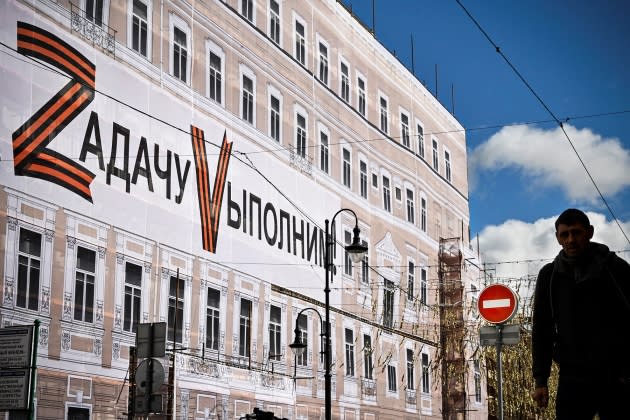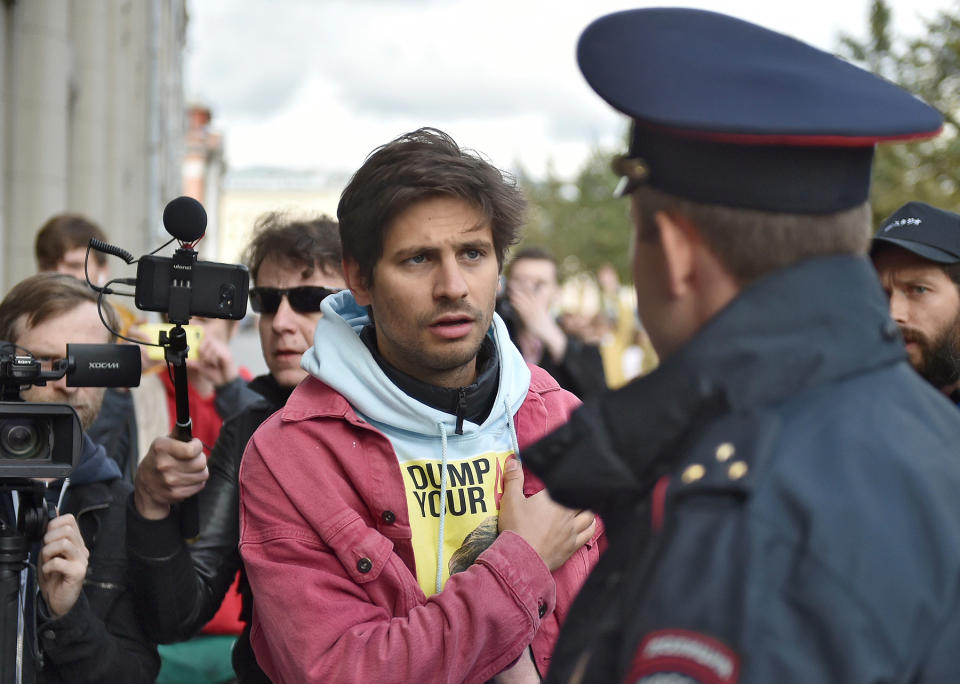The Kremlin Cracks Down on Moscow’s Artists: ‘The Life We Had Before the War Is Over’
- Oops!Something went wrong.Please try again later.

Less than a year ago, I was a successful director and screenwriter in Moscow. Now, I spend my sleepless nights in New York City, trying to find airline tickets for my friends to escape Russia before they’re sent to the front lines or arrested.
I was about to begin making a movie when the Kremlin started bombing Ukrainian cities. Dozens of actors and a film crew were waiting for me to begin shooting. Many of my friends had already fled the country that week. They called me every five minutes, asking why I was still in Russia. As the violence in Ukraine escalated, the state cracked down on Russian artists and anyone who had spoken against the war.
More from Rolling Stone
News of the grinding conflict grew worse by the day. Then one afternoon on the film set, I saw reports that a special commission called GRAD had emerged from the Russian Duma, named after the deadly Russian multiple-rocket launch system. GRAD’s mission was to “counter Western influence in the sphere of culture.” Among its first targets: the host of a late-night TV show, Ivan Urgant, and me. Public officials demanded the Bolshoi Theatre, where I had directed ballets and operas, to fire me.
The MPs held a meeting and decided that several public figures — including me — should be suspended from work in Russia, unless we expressed a clear support for “the special operation.” More than one official suggested sending me to the Donbas front lines.
The pressure on artists, comedians, and especially directors has been ruthless in Russia. As a result, a dozen or so of the most celebrated theater directors working in Moscow before the war have left the country. Once these men and women had made our city one of the most remarkable theater capitals of Europe. Now, any performance has to be careful so as not to offend the Kremlin’s feelings. Those who were not ready to cave in and play that game, chose to give up their opportunities, resources, stages, and salaries and run. They escaped Russia to foreign countries, counting only on their own talents and starting over from scratch.
The GRAD attacks didn’t seem serious at first, and I kept posting on Instagram, calling for the war’s victims to tell us about their suffering, and what was really going on in Ukraine. At one point a pro-Kremlin journalist posted on social media about my anti-war posts: “Look, this director is in the age to be drafted! Take a look at what he says about the special operation.” This led to a round of online anger and threats — and paranoia.

Nights became nerve-breaking, and I was certain I was being followed. One night, my friend was at a meeting with a well-known restaurateur, when he received a phone call and immediately walked out. When he came back, he asked her, “Where is Sasha now?” She told him I was in the office. He looked at her and said, “You have to go to the airport right now.”
But even then my inner voice said, “You can’t run when everyone is running! It’s panic!” Every approaching car seemed dangerous. Fear dominated our days and nights.
We won the Golden Mask award for a ballet version of Checkhov’s The Seagull, the story of a young man who dreams of a free Russia. Dmitry Krymov, a well-known director, was also awarded a Golden Mask, after he had left Russia in protest against the war. He asked to pass it to the Nobel Prize winner Dmitry Muratov, who just a day before had been attacked by some radicals — so called ura-patriots splashed red paint on his face. Afterward, Krymov made a joke, and said that Muratov should not take his Golden Mask off, that it would protect him. Six months into the war, Krymov has paid for the joke and for his anti-war position: All of his productions were banned from Russian theaters.
All of my plays were soon also banned. When the announcement came, I knew I had to flee.
My own departure was peaceful enough. No one stopped me at the Finnish border. But on the day I was leaving Russia, probably by a coincidence, I received a text message with photos of my mother’s house in Moscow and my father’s house in St. Petersburg, with threats that I should walk carefully there, otherwise I might accidentally “slip and fall into the river.”
My case was the latest in a chain of attacks on the arts and free speech in Russia. Only a handful of directors are left in Moscow, in a once-thriving theater scene. The bombardment of Russia’s cultural world took place in less than half a year, leaving the Moscow audience without the artists they love. There is only one reason so many artists have left: It’s unsafe and dangerous to express a negative opinion of what Russian authorities call “a special operation,” and what the world calls an invasion.
If I knew that I would only go to jail in Russia, that they would not send me to kill or be killed on the front, I would have kept creating art in Russian theaters, factories, and basements. Now, I’m in exile in New York, studying at Columbia University, trying to find a way to stage plays again, and waking every night around 2 a.m. — morning in Moscow — trying to find some safe passages for colleagues in the Moscow art scene who have been left behind.
The world loves Russian theater. It has survived under Josef Stalin, Nikita Khrushchev, and Leonid Brezhnev. It will outlive Putin, too. I have dreamed of producing Russian drama all of my life. But the life we had before the war is over. Russian theater is universal. The pain in the works of Chekhov, Nikolai Gogol, Fyodor Dostoevsky, and Leo Tolstoy are understood and appreciated all over the world.
I will work on my dramas, operas, and ballets abroad. “We will work,” as Sonya says in Uncle Vanya. We will “look for new forms,” as Treplev says in The Seagull. The theater will live on.
Best of Rolling Stone

